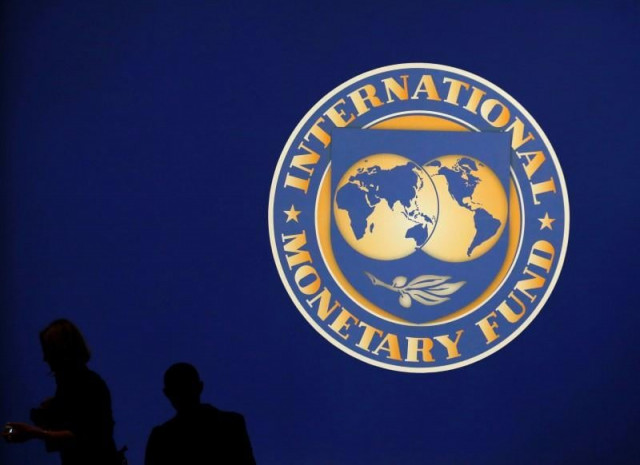PTI govt banks on IMF to prevent economic havoc
Finance Minister Asad Umar says rupee will nosedive against dollar, new investment will cease if deal not signed

Visitors are silhouetted against the logo of the International Monetary Fund at the main venue for the IMF and World Bank annual meeting in Tokyo. PHOTO: REUTERS
"Inflation will actually rise more if we don't enter the IMF programme," he maintained while addressing a live question and answer session on the state of the country's economy.
"In case of a no-IMF deal scenario, new investment will cease and the rupee will nosedive against the dollar," he added.
However, the minister hoped that an agreement would be reached with the IMF soon.
Responding to other queries, Umar described high inflation and the slowing economy as the two key challenges for the government.
"Public debt is also likely to remain high and won't reduce anytime soon," the minister said, acknowledging that the tough economic phase was creating difficulties for the people and having a painful impact.
Asad Umar hints at withdrawing tax exemptions for elite
"When one attempts to move out of a balance of payment crisis, inflation rises," he explained.
The minister said the decision to delay the IMF deal because of the harsh conditions it was imposing had actually benefitted the country.
"The IMF conditions are less stringent today than they were four months ago," he added. "The government didn't just wait for the IMF deal and also took other steps to overcome the crisis."
The minister further said though the immediate crisis was over for now, the stabilisation period would continue for two years.
The public debt-to-GDP ratio would gradually decrease but even by 2023 when the Pakistan Tehreek-e-Insaf (PTI) government would end its five-year term, it would still be above the statutory threshold of 60 per cent.
At the end of the previous government's tenure, the debt-to-GDP ratio stood at 72.5 per cent -- far higher than the limit prescribed in the Fiscal Responsibility and Debt Limitation Act.
An internal assessment of the finance ministry showed that in just the first three years of the PTI government, public debt would jump by Rs10 trillion to Rs35 trillion. The assessment is based on low revenues, higher expenditures and currency devaluation.
PTI govt announces tax package to boost revenue
To a question, the finance minister said it would be difficult to create enough jobs without a booming housing sector.
"The IMF's assessment was that the situation inherited by the PTI government was the worst in decades," he maintained.
Tax amnesty
Umar admitted that offering a tax amnesty scheme was a controversial decision because of its moral implications.
However, he added, the majority view was that the tax amnesty scheme would help overcome the problem of tax evasion given the existing system in the country.
Umar made it clear that public office holders and civil servants were not eligible for the scheme.
"Pakistan's economic troubles are rooted in an unsustainable budget deficit and the current account deficit," he said. He added that Rs8 trillion in tax collection was still a realistic target for the year 2023 despite the Federal Board of Revenue's (FBR) poor performance.
IMF talks
Teresa Daban Sanchez, the resident representative of the IMF, told The Express Tribune that discussions on policies and reforms that could be the base for a staff-level agreement were still under way. She was asked to comment on whether or not a staff-level agreement was possible by the third week of the current month, as was indicated by the finance minister.
The rupee has again been shedding its value, albeit gradually this time, and was traded at Rs141.40 in the interbank market.
According to Dr Hafiz Pasha, a former finance minister, unemployment will hit its peak and the number of people living below the poverty line would also increase every year during the stabilisation period.



















COMMENTS
Comments are moderated and generally will be posted if they are on-topic and not abusive.
For more information, please see our Comments FAQ